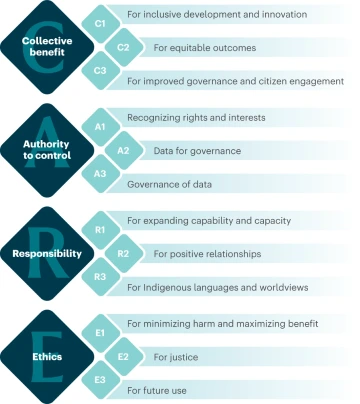Using the CARE Principles to Preserve Indigenous Data Sovereignty

Indigenous Peoples rights to data sovereignty are often neglected during ecological or biological research, resulting in sensitive Indigenous Knowledges being mishandled. A recent publication including SWEHSC member Dr. Stephanie Russo Carroll revealed how implementing the CARE Principles (Collective benefit, Authority to control, Responsibility, Ethics) improves Indigenous Data Sovereignty and build stronger relationships with tribal partners.
What were their key findings?
This publication highlights the importance of following ethical guidelines when working with Indigenous communities to safeguard Indigenous data sovereignty and sensitive information. In 2018, Dr. Russo-Carroll co-led the Indigenous Data Sovereignty Principles for the Governance of Indigenous Data Workshop, which drafted a set of ethical guidelines for handling Indigenous data. These ethical guidelines, known as the CARE principles, are a set of principles that aim to promote strong collaborative partnerships between researchers and Indigenous Peoples. They guide researchers in how to understand and respect the governance of Indigenous data by Indigenous Peoples and in how to share control in their research projects. In this study, Dr. Russo Carroll and her co-authors emphasize that incorporating the CARE principles into ecological research can result in more ethical data management.
What is Indigenous data sovereignty?
Indigenous data sovereignty is the right of a nation to govern the collection, ownership, and use of its own data. This includes data related to their cultures, languages, land, resources, and traditional knowledge. In Tucson, SWEHSC researchers are working to improve Indigenous data sovereignty for tribal nations located throughout the Southwest United States.
Why is it so essential to preserve it?
Much of Earth’s biodiversity lives and exists on Indigenous lands. However, most of the data derived from samples taken from Indigenous lands are not accessible to Indigenous communities. Indigenous Peoples’ rights to data sovereignty are often neglected during ecological or biological research, resulting in sensitive Indigenous Knowledges being mishandled.
What are the CARE principles?

Notes: The CARE Principles of Indigenous Data Governance were created to advance the legal principles underlying collective and individual rights by considering power differentials and historical contexts of data in advancing Indigenous innovation self-determination. Image adapted from the publication's ref. 9, © Carroll, S. R. et al. CC-BY 4.0.
Why did this publication highlight the CARE principles in ecology and biodiversity research?
Researchers are increasingly focused on ecology, seeking out Indigenous partnerships to conduct this research on Indigenous lands. This publication highlights how using the CARE principles in these partnerships can build trust and community ethics – a needed change in the current research landscape. The publication also provides a framework to standardize practices, while accounting for “evolving data and research landscapes.”
What are some examples of the CARE principles in action?
Collective Benefit: Researchers should work with communities to develop frameworks that dictate how to handle and classify Indigenous data. This line of communication should involve explanations of how and why the research being done is valuable to Indigenous communities and individuals. Indigenous research experts should be compensated throughout the research process.
Authority to Control: Preserving Indigenous authority to control can be achieved by creating and implementing data management plans. Institutional principles for research development, data management, and publication must be established to support Indigenous data sovereignty. Indigenous communities should also have access to data and research results in usable formats.
Responsibility: Researchers have a responsibility to conduct research that is inclusive and relevant to the needs of Indigenous communities and individuals. This principle underscores the importance of conducting research with Indigenous communities in a way that respects their values, needs, and interests and ensures that the research has a positive and equitable impact on those communities. Data that is collected during research should be stored and uploaded to a secure place that can be accessed by appropriate tribal authorities.
Ethics: Researchers involved in partnerships with Indigenous communities should conduct research while abiding by Indigenous ethical frameworks, clearly communicating to the appropriate Indigenous officials about all aspects of the research – including how it will benefit the community, who will be involved in the data collection process, and what data will be collected.
Further Reading
Global Indigenous Data Alliance. (n.d.). CARE Principles for Indigenous data governance [Overview and resources]. www.gida-global.org/care
Russo Carrol, S., Garba, I., Figueroa-Rodríguez, O. L., Holbrook, J., Lovett, R., Materechera, S., Parsons, M., Raseroka, K., Rodriguez-Lonebear, D., Rowe, R., Sara, R., Walker, J., Anderson, J., & Hudson, M. (2020). The CARE Principles for Indigenous Data Governance. Data Science Journal, 19, Article 43. doi.org/10.5334/dsj-2020-043
Russo Carroll, S., Rodriguez-Lonebear, D., & Martinez, A. (2019). Indigenous data governance: Strategies from United States Native Nations. Data Science Journal, 18, Article 31. doi.org/10.5334/dsj-2019-031
